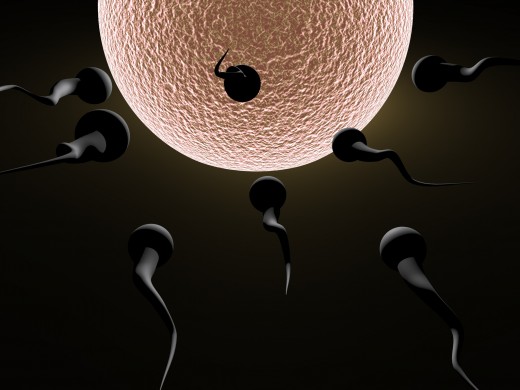Cryogenics

Suspended Animation, Pulse Optional
Want to travel to the distant future, to a distant world, be able to live to see what happens to the great-grandchildren of your great-grandchildren's great grandchildren? Would you like to be ageless, to take advantage of all the medical knowledge of the future, and perhaps even age backwards? Heck, I know I would! But everlasting life is not for the faint of heart- there's no going back, and there's no guarantee that where (and when) you're going to will be any better than here.
But it's worth a shot, right?
This is the realm of cryonics, or as it's more widely known, cryogenics; freezing something (organic or otherwise,) to put it into what essentially is a state of suspended animation. For most of us, Cryogenics sounds like something out of science fiction, something relegated to 20th Century Fox's "Aliens" series, or something so obviously ludicrous (at this point in time, anyway,) that it's nothing more than a money-trap for the rich and gullible. Yellow journalism as well as the cartoons of such famous artists as Gary Larson have given cryogenics a bad name- not that some of that reputation isn't deserved. In 1987, only three of the several dozen pioneers, (cryogenic guinea pigs, if you will,) including the original "cryonaut" James Bedford, were still frozen- the rest had thawed, unlucky men and women whose cryogenic companies had folded or whose relatives had refused or been unable to pay for the storage of their dead forebears. But, times change, as they always do, and cryogenics has become a very real, very safe scientific reality- though with one catch; We're not too sure about the unfreezing process yet. No one has been successfully "thawed" yet, but that's not to say there were failures- quite the opposite, actually; while no cryogenically frozen human beings have been awakened from their icy slumbers, test results on Animals (though no mature, multicellular adult organisms have actually been deep frozen for a long period and thawed directly, per se,) are promising. But don't let that dash your hopes- cryonists agree that it can be done, but has not for one simple reason; all their patients are dead.
Well, legally dead, anyways. But therein lies the beauty of being cryogenically frozen; in the legal sense, death occurs when the heart stops, but the brain is still active and viable for a long time after that. No joke- despite popular opinion that the brain dies after four to six minutes without oxygen, recent advances in medical technology have proven that a person can be resuscitated up to an hour after cardiac arrest without any ill neurological affects! One hundred years ago, that was completely unheard of, and medical "technology" was so primitive that it was rare for a person to be resuscitated at all. Imagine how long an individual might be able to be legally dead before they're brought back from the brink of oblivion in the future, and without any long-term effects to boot! So what have you got to lose? You'll be dead anyway and, as a matter of policy, they promise not to wake you until they have the technology to repair and/or replace your body, (within the theoretical window of thirty-thousand years, of course, as normal degradation from cosmic sources is supposedly irreparable at that point) allowing you to actually enjoy the future when you get there!

Not Just for the Living Dead
But, as the title suggests, cryopreservation isn't just for the living dead; the implications of this technology are far-reaching and are already finding important uses in everyday life! As a medical technology, cryogenics goes beyond freezing the body of a recently "deceased" individual for eventual awakening; donor organs (and likely cloned organs at some point too) and tissues, as well as unusual growths (being sent to labs for proper analysis) are already being frozen for transport to distant recipients, and the technology involved is only getting better. Sperm banks even rely on a form of cryogenics to keep their stock viable (it's said that freezing the male gametes allows them to keep almost indefinitely,) though the technology has also been (and is being) used for ova, zygotes, and even embryos.
Long-term cryopreservation for space travel is another useful application for cryogenic technology- if people can be frozen and resuscitated, why not freeze them while they're healthy so that they might be thawed out years later without aging a day? If time does in fact dilate as the speed of light approaches as Einstein theorized, then a trip to the nearest star, even at high velocity, could take decades, even centuries, and would require something akin to a colony ship (think Noah's ark,) in order for humans to reach it. And then, the question becomes, after generations upon generations are born, live, and die within the walls of such a ship, will they want to leave and colonize a new world, and if they did, what will they do if the planet they intend to settle on is already occupied by a species as intelligent as ourselves? Will they turn around? Will they instigate an interstellar war? Why deal with those what-if's at all? Cryonics holds the answer; a crew that goes into stasis (VIA cryogenic methods, as they seem to be the most viable means of achieving suspended animation at this point in time) for its long journey to the stars will not age, does not require food, drink, or oxygen, much less waste-processing facilities (like toilets), and probably wont mind going back to the "freezers" if the planet they intend to colonize is already inhabited by a sentient species that isn't interested in peaceful coexistence.
But then, this particular application of cryogenics is why even NASA has a Cryogenics and Fluids branch of that does all manner of research on cryopreservation, attempting to discover the most effective, efficient, and economical means of freezing both organic and inorganic payloads for long (and even sometimes short) term storage.
So what's the most compelling evidence in favor of the cryopreservation of humans, either after legal death or as a form of suspended animation? For me, it's the fact that a human sperm and a human egg, frozen separately in 1983, were united after twenty-one years of cryogenic storage, producing a healthy baby boy that has yet to suffer any ill effects from the procedure. (as reported in Europe's reproductive medical journal "Human Reproduction".) We can do it; we have the technology, but it's going to be a while before we can effectively apply it in such a way as to awaken cryopreserved individuals who are, in the eyes of the law, dead. Just imagine, waking up one morning and learning that, though you had died in your sleep, you were cryogenically frozen and kept in stasis until now, until what had been, for you, a distant future, when aging is considered a disease that is easily treated and even reversed. Imagine ageless astronauts traveling to the distant corners of the universe with fresh fruits, vegetables, meats and grain products waiting for them every time they're woken from their icy slumber with pre-grown, cloned organs (or even full bodies) ready for them when their first theoretical 30,000 years is up (though advances in Molecular Nanotechnology might just make organ replacements a non-sequitur.) Sure, it sounds like science fiction now, but in the future, who knows- all of this could one day be just another accepted part of reality, thanks to cryogenics.
Don't you want to live forever?




